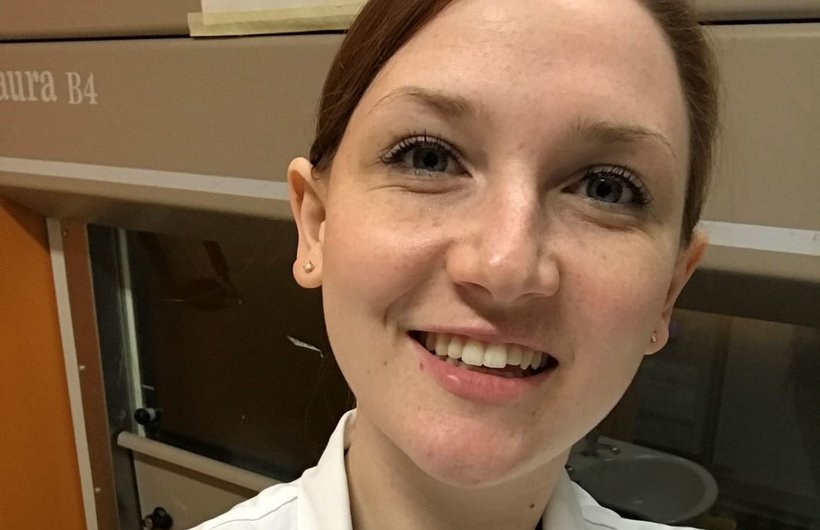From lab bench to Solving Kids' Cancer UK: Introducing Research Officer, Leah
In June this year, we welcomed Leah to Team Solving Kids' Cancer UK as our new Research Officer. Leah manages our extensive research portfolio, keeping track of project progress and engagement with our research community. But before she moved into research management, she herself wore the lab coat, researching novel cancer treatments. Here she shares her journey from the lab to Solving Kids' Cancer UK's research team.
Beginning a career in research
Before joining Solving Kids' Cancer UK, I was a Cancer Biologist. I spent most of my days in a white lab coat and blue gloves, with my head in a tissue culture hood. Life as a scientist was always challenging and exciting, and I felt a strong sense of pride in my work.
I knew early in my education that becoming a medical doctor wasn’t for me, but I didn’t know much about medical research until I started my undergraduate degree in Biomedical Sciences. Here, I fell in love with medical research, and I would take any opportunity I could to get from the student labs into the research labs, so I would spend my summers volunteering to work in the research labs to get more experience. It became clear very quickly that squirrelling away at a lab bench was the place I wanted to be, and I didn’t look back for 10 years.
My first research position was as a research assistant at Great Ormond Street Hospital, Institute for Child Health. Here, I worked in a CAR-T cell laboratory and my role was to identify novel targets for immunotherapy for children with brain tumours. After two years as a research assistant I wanted more autonomy in my research so I decided to study for a PhD at the Blizard Institute at Queen Mary University of London. Here, I studied oral cancer, and I developed a test which can be used to help better predict a patient’s prognosis. It is hoped that this test will get more patients on the right treatment pathways, resulting in better outcomes.
Discovering the barriers to progress
As my research career progressed, I started to understand more about the challenges faced by the research and medical communities in their efforts to get new treatments to patients. Undertaking medical research is a long and difficult process, for example I spent three years during my PhD trying to answer one question for one type of cancer. This work resulted in a promising outcome but will now have to go through the process of study expansion and then clinical trial. The problem is, we haven’t yet secured further funding for this next part of work. This means that, for now at least, there is a test which has the potential to change (and save) the lives of people suffering from oral cancer, but no one is working on it, and it is getting no closer to the patients who need it.
This is why I decided to make the move into the charity sector. The pathway from medical research to clinical research and finally into clinic as the standard of care is long and inefficient, so I decided to move my focus away from scientific discovery and into pushing breakthroughs out of the labs and into the clinics.
Setting out to deliver change
SKC is passionate about accelerating pioneering research that will save lives and improve outcomes for children. My goal at SKC is to use the skill set I have developed as a research scientist to push more treatments out of the laboratories and into the clinics by supporting the important and promising research that SKC funds. By working to accelerate the development of better treatments, we aim to give children with neuroblastoma an improved range of options, and ultimately change the outlook for children and families faced with a neuroblastoma diagnosis.
SKC is a small but mighty charity filled with passionate people who want to make a difference to the lives of children and families effected by neuroblastoma. I am honoured to now include myself among these people and I can’t wait to see what we can achieve together.





